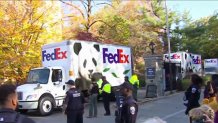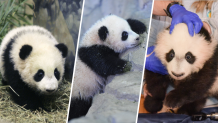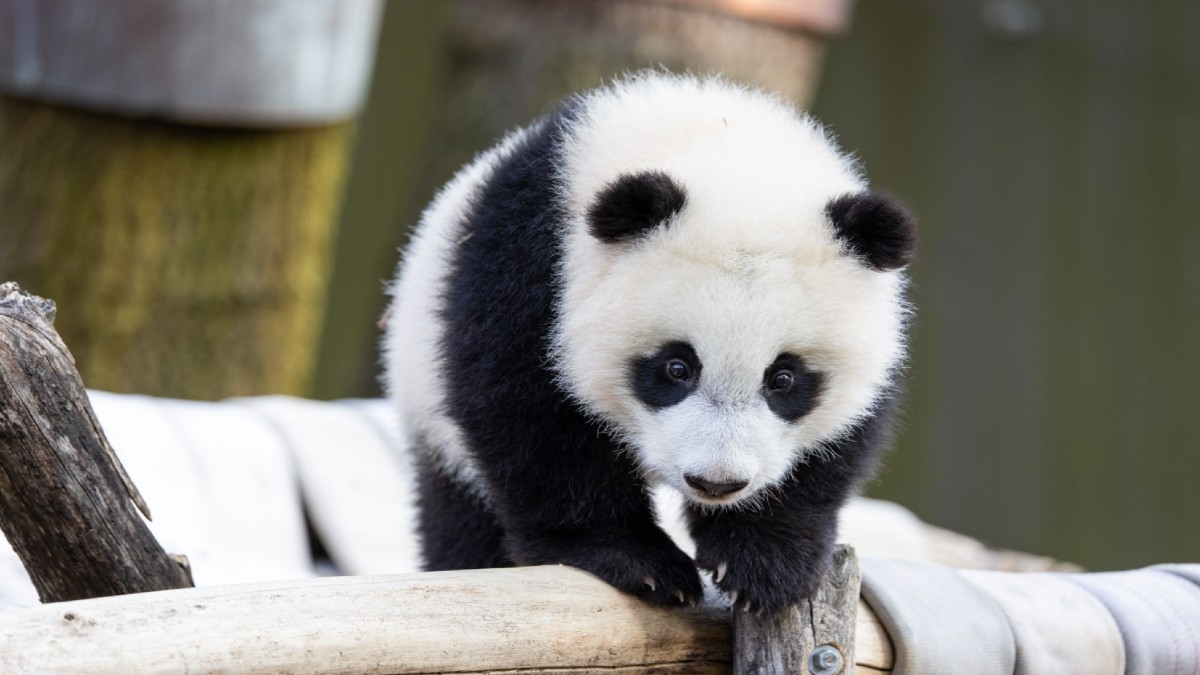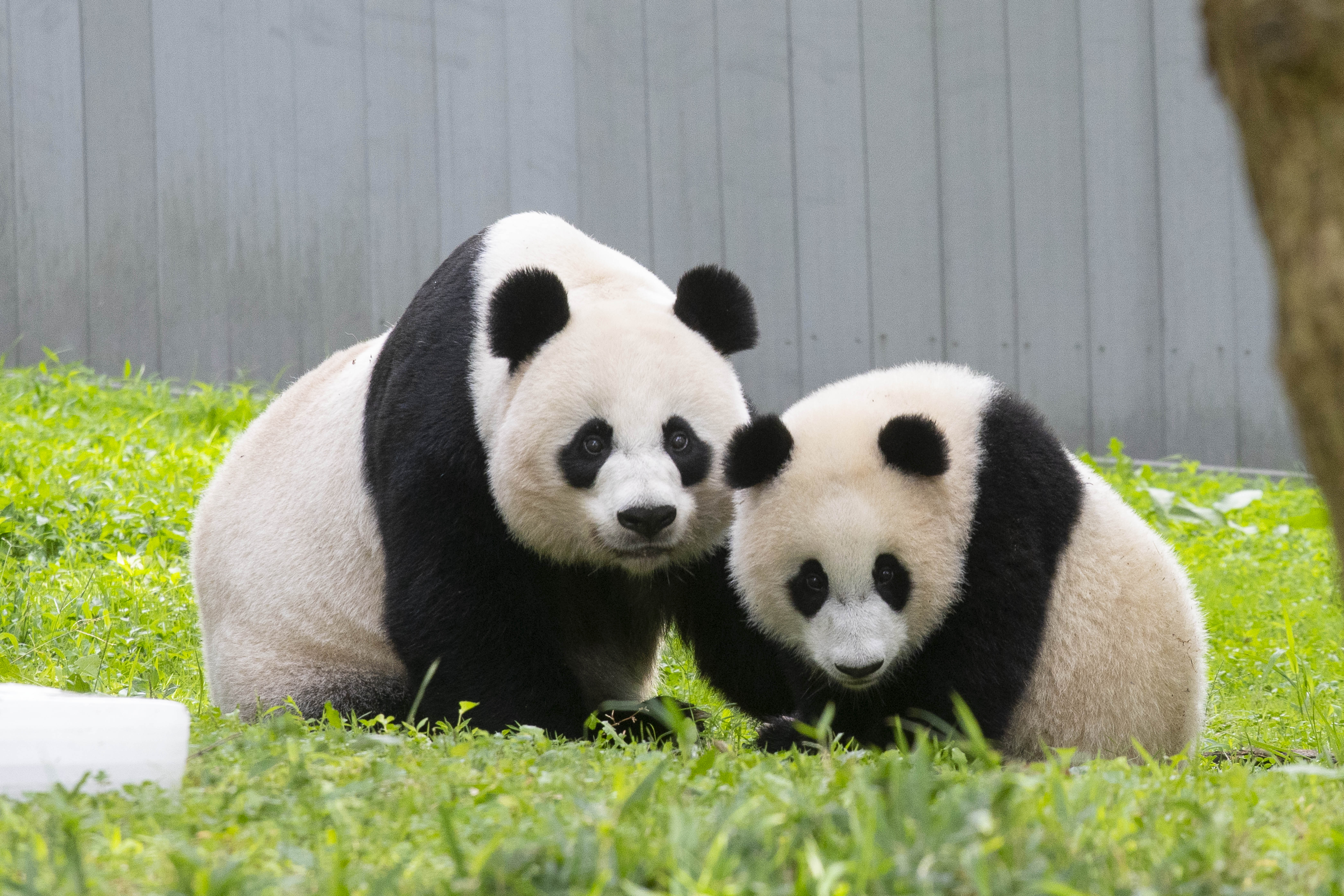After traveling halfway around the globe, D.C.'s beloved pandas made it to their final destination in China Thursday morning, the National Zoo said.
Tian Tian, 26; Mei Xiang, 25, and their youngest offspring, 3-year-old Xiao Qi Ji, departed D.C. Wednesday for their new homes at the China Wildlife Conservation Association.
A FedEx "Panda Express" plane took the pandas on the 19-hour journey from Dulles International Airport to Chengdu, China.
“It’s a moment of joy because this is one more step in 50 years of a successful giant panda conservation program, and hopefully the beginning of 50 more years,” National Zoo Director Brandie Smith said. “Please know the future is bright for giant pandas. We remain committed to our program, and we look forward to celebrating with all of you when pandas can return to D.C.”
We're making it easier for you to find stories that matter with our new newsletter — The 4Front. Sign up here and get news that is important for you to your inbox.
A new life in China
Tian Tian, Mei Xiang and Xiao Qi Ji's new home at the China Wildlife Conservation Association is basically "a panda base, if you will," according to Bryan Amaral, senior curator at the National Zoo.
"It's a place where they have lots and lots of giant pandas, very similar to what you would see — how our giant pandas live here, very similar to that," Amaral said. "They just have a lot more giant pandas than we have. Where we have elephants and, you know, all kinds of other things, they have just pandas."
While Mei Xiang and Tian Tian will live the rest of their days in retirement, Xiao Qi Ji will enter the giant panda breeding program when he reaches sexual maturity between 6 and 7 years old, the zoo said.
The long journey
Mei Xiang was the first panda to be loaded into a white FedEx crate and onto a truck Wednesday morning, followed by Tian Tian and Xiao Qi Ji.
Crews moved the large crates like heavy fragile equipment into specially marked trucks before a police motorcade fit for a president escorted them out of the zoo's gates.
Meanwhile, an emotional crowd of onlookers gathered at the National Zoo's gates to say their goodbyes to the pandas.
One little boy who was clutching a panda stuffie named "Panda Panda Panda" had expected to see the pandas that morning at the zoo.
"I'm gonna cry when they leave," he said.
“I thought it was right to say goodbye to a D.C… a D.C. part of our family,” a man from the D.C. area said.

When the pandas arrived at the airport, crews carefully off-loaded them and hoisted them onto the Panda Express.
Mei Xiang could be seen peeking out of the window of her crate on the way to the plane, giving the D.C. area what felt like one final goodbye.
"It is a moment with some heartbreak in it, but it is also a moment of joy, because we are celebrating the world's longest running conservation program for a single species," Smith said.
As the plane ascended into the sky, people watching below erupted into applause.
In-flight amenities
Two Smithsonian zookeepers and a veterinarian joined the pandas for the roughly 19-hour journey to ensure they were well cared for.

Zookeepers also packed plenty of food and snacks to keep the pandas happy during the long trek, including:
- 220 pounds of bamboo
- 8 pounds of leaf-eater biscuits
- 5 pounds of low-starch biscuits
- 6 pounds of apples
- 5 pounds of carrots
- 6 pounds of sweet potatoes
- 3 pounds of sugar cane
- 1 pound of pears
- 1 pound of cooked squash
A National Zoo without pandas
While it's not the first time D.C. has had to say goodbye to pandas at the National Zoo, it's the first time in 23 years that the panda exhibit at the zoo is empty.
Once the pandas left the zoo, signs went up indicating the panda enclosure was closed.
The panda cam was taken off the zoo's website, with the following message in its place: "Thank you for visiting the Giant Panda Cam page. Tian Tian, Mei Xiang and Xiao Qi Ji have departed the Smithsonian’s National Zoo and Conservation Biology Institute and are now on their way to China."
The National Zoo's now-empty panda enclosure will undergo a $2.5 million renovation, Smith said. The zoo expects to finish the renovations in the next eight to 10 months, and might put other animals in the enclosure temporarily.
After today, the last two pandas in the U.S. will be at Zoo Atlanta.
'Heartbroken for us'
D.C. residents have been lamenting the impending loss of the pandas since the National Zoo announced its "Panda Palooza" event back in August.
"I'm very sad; I will miss him very much," said Rachel Weidner, a tourist who came from Philadelphia to visit Xiao Qi Ji on his last birthday in the U.S.
"But I know that he will be well taken care of," she said. "And I know that I can still follow him, and maybe even come visit him someday."
Weidner sported an entirely black-and-white outfit during her visit, complete with a headband topped with mini panda heads, hoping that the pandas might see a kindred spirit and "come and say hi" while she was at the zoo
The pandas' keepers are just as sad about their departure, although they also know the pandas will be well cared for in their new home.
"The one-on-one relationship is probably the best part of my job," said curator of pandas Laurie Thompson. "They know us really well. They are comforted by us and they trust us. So in a time of stress when they don't know what's going on, I suspect they will come and sit next to me and tell him he's a good boy."
Thompson said she was focused on getting the pandas ready to travel — and will "have my breakdown" after the pandas disembark their plane in China.
"I'm excited for their future," Smith, the zoo's director, told News4. "Although I'm a little bit heartbroken for us."
Reliving DC's panda history (including all those squishy, adorable babies)
Those living in the DMV know they had something special with these pandas.
As News4's Eun Yang — the biggest panda fan in our newsroom — said: "Seeing these roly-poly black-and-white floof balls at the National Zoo enjoying life has been a joy for me. And I aspire for a time when I, too, can just frolic in my yard, sleep whenever and wherever I want, and eat and eat again."

"They remind me that even in D.C., you can be relaxed and carefree," Yang said.
Since the beginning of the research exchange program, pandas have always served as a kind of soft diplomacy between China and the U.S. The zoo's first pair of pandas, Ling-Ling and Hsing-Hsing, were gifted in 1972 to commemorate President Richard Nixon's historic trip to China that year.

Those pandas died in the 1990s, leaving behind no surviving cubs. But Mei Xiang and Tian Tian turned that luck around for the zoo.
The second pair arrived at the zoo in 2000, when they were loaned to the Smithsonian Institution by the Chinese government. An agreement with China that year "stipulated [Mei Xiang and Tian Tian] would live at the Zoo for 10 years in exchange for $10 million," according to the zoo's website.
A decade later, in January 2011, the Smithsonian and the China Wildlife Conservation Association signed a new Giant Panda Cooperative Research and Breeding Agreement, which stated the pandas would stay until December 2015. That contract was extended to 2020, then again to 2023, shortly before each previous contract expired.
But there were no more extensions.

Over the years, Mei Xiang and Tian Tian bore four surviving cubs amid several losses. Starting with Tai Shan, born in 2005, the cubs became the first ever to grow up at the National Zoo after decades of dashed hopes.
One after another, the roly-poly babies delighted visitors and Panda Cam viewers with their antics.

There was plenty of heartbreak along the way.
When Tai Shan was born in 2005, D.C. went wild for the cub who would become known as "Butterstick," nicknamed for the tiny size of a panda cub at birth.
But the next seven years ticked by with no more cubs, despite the efforts of keepers and vets. A new cub arrived to much excitement in 2012, only to die a week later.
The following year, another baby arrived, along with a stillborn twin. The living cub, Bao Bao, survived and thrived. And two years after that, twin cubs were born. While one did not survive; the other, Bei Bei, would go on to delight panda fans once more.
Previous panda departures
All three of Tian Tian and Mei Xiang's oldest offspring moved to China when they were a few years old.
Tai Shan took his flight in 2010, to much fanfare and sadness from District residents.
Bao Bao, his younger sister, traveled to China in 2017 and settled into her new home quickly, according to the Associated Press.
"True to her character, Bao Bao was very independent and began taking food from her new keeper immediately," a Smithsonian zookeeper who traveled with her to China said at the time.
In China, Bao Bao has since had cubs of her own.
Bei Bei moved to China in 2019, landing safely after a 16-hour direct flight, complete with road snacks in the form of bamboo, apples, sweet potatoes, leaf eater biscuits and water.
Why are the pandas leaving now?
The short answer is that this year is simply the expiration date for the research agreement contract between the U.S. and China. But the long answer is a little more complicated than that.
The pandas are leaving D.C. at a time when, according to the Associated Press, there's a larger trend of China pulling back its pandas from multiple western zoos as their agreements expire. It's happening as diplomatic tensions run high between Beijing and a number of western governments.
National Zoo officials have remained tightlipped about the prospects of renewing or extending the agreement, and repeated attempts by News4 and the Associated Press for comment on the state of the negotiations did not receive a response.
Dennis Wilder, a senior fellow at Georgetown University's Initiative for U.S.-China Dialogue on Global Issues, called the trend “punitive panda diplomacy" when talking to the AP. He noted that two other American zoos have lost their pandas in recent years, while zoos in Scotland and Australia are facing similar departures with no signs of their loan agreements being renewed.
Despite the links to U.S.-China diplomacy, the negotiations are researcher-to-researcher and not based in politics, Smith, the National Zoo's director, told News4 back in August.
"We're a bunch of scientists; we're a bunch of animal people," Smith said. "This is not a political conversation. This is absolutely a conversation between colleagues talking about, what's best for the overall program, and also, what can be best for individual animals?"
While the zoo won't be quite the same without our giant friends to roll around eating bamboo, at least we have Basil to console us.
The Associated Press and Carissa DiMargo contributed to this report.



